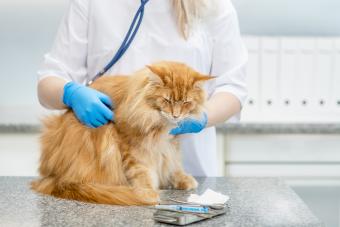
Seeing your cat attack their tail or their back suddenly twitch can be a little puzzling. Veterinarians aren't exactly sure what causes feline hyperesthesia syndrome (FHS), but they are sure of one thing: it causes odd, episodic behaviors in cats that sometimes alarm their owners. Being aware of the signs of hyperesthesia in cats can give you a better idea if your own cat has it or if they're just being a normal, quirky kitty.
What Is Feline Hyperesthesia?
The term hyperesthesia essentially means "abnormally high skin sensitivity." Cats with this syndrome show abnormal sensitivity along their back and spine when touched. Typically, the muscles beneath the skin contract and make the skin "roll" along the spine.
Feline hyperesthesia is also known as "twitchy cat syndrome" or "rolling skin disease."
Signs of the Feline Hyperesthesia
Skin rolling or rippling is only the tip of the iceberg. Cats with feline hyperesthesia show a variety of odd behaviors, often similar to those associated with seizure disorders. Some signs that might point to your cat having this syndrome include the following.
- Your cat often stares at its tail in a trance-like state with dilated pupils.
- Some cats will suddenly attack their tail, biting at it and their back, sides, or other body parts.
- Some cats will tear around the house while yowling and hissing.
- Some felines may display behavior that's completely opposite from their normal disposition.
- When you go to pet your cat, they might react suddenly and try to bite.
- Tail twitching is common with feline hyperesthesia.
- Most cats experience obvious muscle spasms.
- Some cats turn to self-mutilation by chewing and pulling out their hair.
- You might notice skin lesions at the site of the discomfort.
FHS can affect any cat, but it’s usually first seen in younger cats between the ages of one and five years old.
Is Feline Hyperesthesia Painful?
Cats with feline hyperesthesia can experience mild to severe pain depending on their condition and associated disorders, such as arthritis. Some cats that suffer from the disorder may even chew or bite at themselves to relieve the sensations associated with the condition.
Diagnosing Feline Hyperesthesia Syndrome
Diagnosing a case of FHS is a process of elimination. Since the signs of this disorder resemble many other conditions that cause itching and biting, your vet will need to rule out more common problems, such as parasite infestation, flea allergy dermatitis, or arthritis.
Neurological disorders should also be ruled out before determining hyperesthesia as the cause of the symptoms, which is typically done via an MRI of the brain.
There are a few breeds that seem to have a higher incidence of feline hyperesthesia, including Abyssinian, Burmese, Himalayan, and Siamese.
Treatment for the Feline Hyperesthesia
If you're worried your cat has this syndrome or they've just been diagnosed, there are plenty of things that can help your kitty. Treatment for FHS usually includes the following measures:
- Behavioral modification to ease anxiety
- Establishing a regular schedule for feedings and playtime to reduce stress
- Refraining from any activity that triggers an episode of hyperesthesia
- Omega-3 supplements to address arthritis and help reduce inflammation
Your vet might also prescribe medical treatments like:
- Amitriptyline or fluoxetine as a mood stabilizer
- Phenobarbital to prevent seizures
- Prednisolone to ease inflammation
- Gabapentin to relieve pain and prevent seizures
Is There a Cure for Feline Hyperesthesia?
There is currently no specific cure for FHS. Treatment, as described above, focuses primarily on alleviating the symptoms through medication and environmental changes. A veterinarian will work to develop a plan for each individual cat using the most effective dosage of regular medication while keeping it as minimal as they can.
Preventive Measures
Since there's no established cause for FHS, preventative measures are the same as those used in the treatment plan for modifying a cat's behavior. This includes reducing environmental stress and avoiding anything that has previously triggered an episode.
Hyperesthesia Can Impact Quality of Life
Feline hyperesthesia isn't fatal, but it is uncomfortable. In most cases, FHS is a relatively mild disorder that only causes occasional disruption of a cat's daily life. But it is possible for a cat to develop an infection if it mutilates itself to the point of creating open sores. If your cat is diagnosed with FHS, work closely with your vet to reduce the symptoms associated with the disorder, so your pet can have as normal and comfortable a life as possible.







